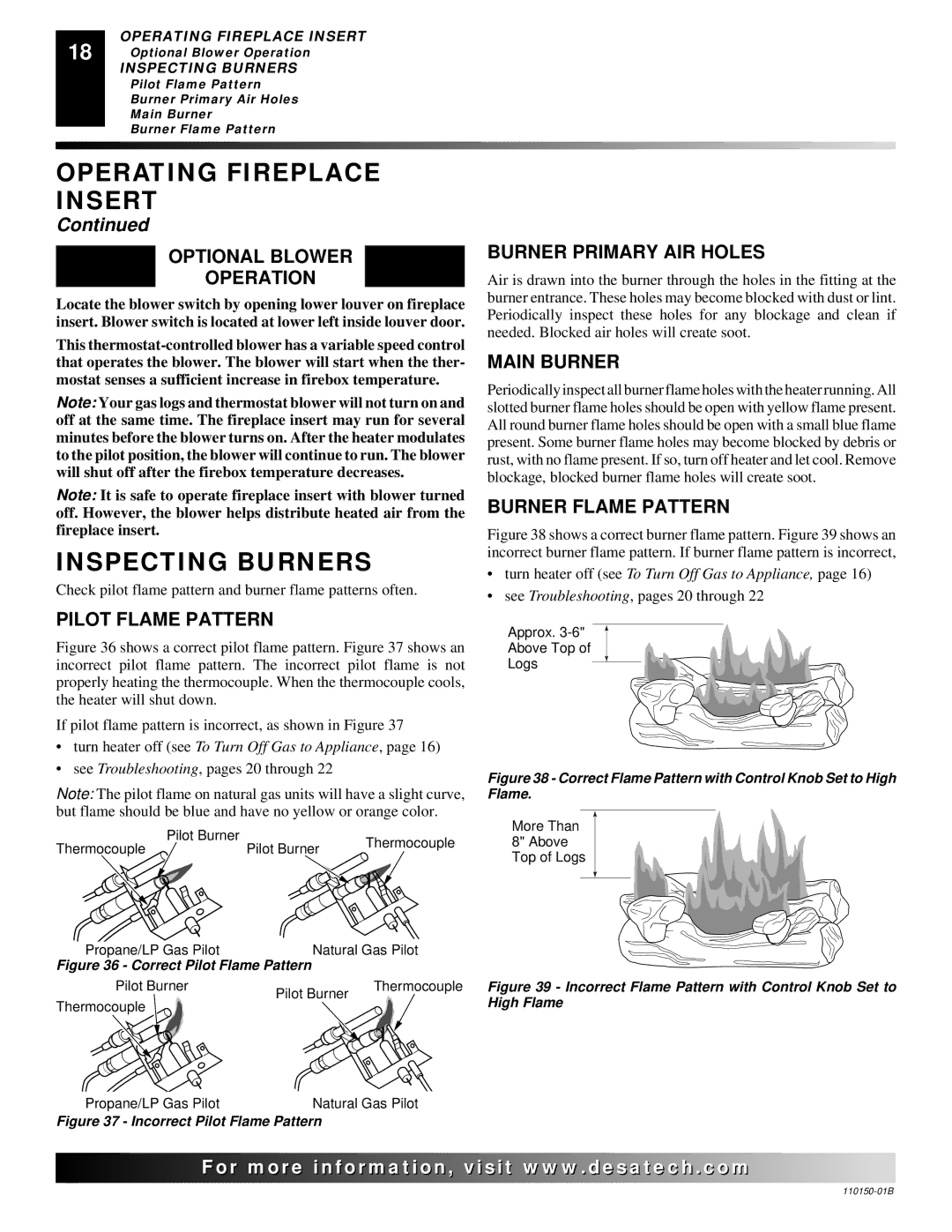
18 | OPERATING FIREPLACE INSERT |
Optional Blower Operation | |
| INSPECTING BURNERS |
| Pilot Flame Pattern |
| Burner Primary Air Holes |
| Main Burner |
| Burner Flame Pattern |
|
OPERATING FIREPLACE INSERT
Continued
OPTIONAL BLOWER
OPERATION
Locate the blower switch by opening lower louver on fireplace insert. Blower switch is located at lower left inside louver door.
This
Note: Your gas logs and thermostat blower will not turn on and off at the same time. The fireplace insert may run for several minutes before the blower turns on. After the heater modulates to the pilot position, the blower will continue to run. The blower will shut off after the firebox temperature decreases.
Note: It is safe to operate fireplace insert with blower turned off. However, the blower helps distribute heated air from the fireplace insert.
INSPECTING BURNERS
Check pilot flame pattern and burner flame patterns often.
BURNER PRIMARY AIR HOLES
Air is drawn into the burner through the holes in the fitting at the burner entrance. These holes may become blocked with dust or lint. Periodically inspect these holes for any blockage and clean if needed. Blocked air holes will create soot.
MAIN BURNER
Periodically inspect all burner flame holes with the heater running. All slotted burner flame holes should be open with yellow flame present. All round burner flame holes should be open with a small blue flame present. Some burner flame holes may become blocked by debris or rust, with no flame present. If so, turn off heater and let cool. Remove blockage, blocked burner flame holes will create soot.
BURNER FLAME PATTERN
Figure 38 shows a correct burner flame pattern. Figure 39 shows an incorrect burner flame pattern. If burner flame pattern is incorrect,
•turn heater off (see To Turn Off Gas to Appliance, page 16)
•see Troubleshooting, pages 20 through 22
PILOT FLAME PATTERN
Figure 36 shows a correct pilot flame pattern. Figure 37 shows an incorrect pilot flame pattern. The incorrect pilot flame is not properly heating the thermocouple. When the thermocouple cools, the heater will shut down.
If pilot flame pattern is incorrect, as shown in Figure 37
•turn heater off (see To Turn Off Gas to Appliance, page 16)
•see Troubleshooting, pages 20 through 22
Note: The pilot flame on natural gas units will have a slight curve, but flame should be blue and have no yellow or orange color.
Thermocouple | Pilot Burner | Pilot Burner | Thermocouple |
| |||
|
|
Propane/LP Gas Pilot | Natural Gas Pilot | |
Figure 36 - Correct Pilot Flame Pattern |
| |
Pilot Burner | Pilot Burner | Thermocouple |
Thermocouple |
| |
|
| |
Approx.
Above Top of
Logs
Figure 38 - Correct Flame Pattern with Control Knob Set to High Flame.
More Than
8" Above
Top of Logs
Figure 39 - Incorrect Flame Pattern with Control Knob Set to High Flame
Propane/LP Gas Pilot | Natural Gas Pilot |
Figure 37 - Incorrect Pilot Flame Pattern
![]()
![]()
![]()
![]()
![]() For
For![]()
![]()
![]()
![]()
![]()
![]()
![]()
![]()
![]()
![]()
![]()
![]()
![]() .
.![]()
![]()
![]()
![]() .com
.com![]()
![]()
![]()
![]()
![]()
